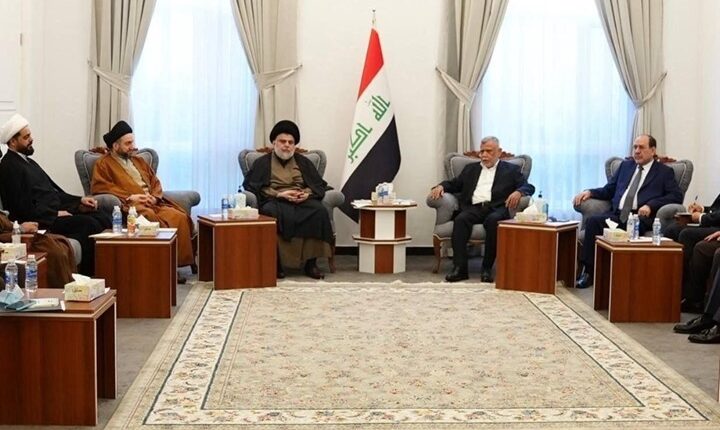Iraq heads towards new early elections after failure of first
ERBIL, KRI, Iraq (North Press) – Talks and statements were increased about the possibility of holding new early elections in Iraq after a proposal made by Muqtada al-Sadr, the leader of Sadrist Movement, that was welcomed by several leaders of Iraqi political blocs, including followers of Coordination Framework.
Earlier, North Press published a report in which it summarized the scenarios of the recent Iraqi crisis, including heading towards new early elections in a step to avoid more dangerous scenario represented by developing the crisis into a civil war.
On Wednesday, after a few days of a high level of tension, al-Sadr announced, in a televised speech, the rejection of dialogue with the Coordination Framework, a collection of mostly Iran-aligned groups, to reach a political solution, calling for the dissolution of parliament and heading towards new early elections.
Fateh Alliance leader Hadi al-Amiri announced supporting holding new early elections.
Al-Amiri said that the previous elections were marred by many suspicions and objections.
The process needs “a comprehensive national dialogue in order to determine the elections’ date, mechanisms and requirements. In addition to provide an appropriate environment to hold honest, fair and transparent elections that restore citizens’ confidence in the political process,” al-Amiri added.
Nouri al-Maliki, the most prominent figure in the Coordination Framework, did not take any direct position towards holding new elections, but he tweeted after al-Sadr speech, saying, “Serious dialogues in which we hope to end conflicts and restore things to the right place starting with the return to the constitution and respecting the constitutional institutions.”
On Wednesday, Victory Alliance leader Haider al-Abadi welcomed al-Sadr’s speech in which he called for new elections.
“I salute his [al-Sadr] steps and all the brothers for preserving blood and achieving reform. I call on everyone to unite to serve the people, reform the system and strengthen the constitutional state, through a healthy and peaceful democratic process,” al-Abadi tweeted.
In the televised speech, al-Sadr said that he is certain that most of the people have got tired of the entire ruling class including some of those who belong to his political current.”
He also called for “a peaceful revolutionary democratic process first, then an early electoral democratic process after the dissolution of the current parliament.”
Al-Siyada Alliance leader Khamis al-Khanjar announced that his bloc supports al-Sadr’s speech “according to new and strong criteria and fair laws that allow a real competition.”
The National Iraqi Alliance leader Eyad Alawi considered the new early elections as an only solution for the political crisis in Iraq and announced his participation in them if they respected the institution.
The early elections that took place about ten months ago, have not resulted in any kind of government formation so far, due to the increasing political dispute that represented by a popular movement and storming of parliament last Saturday.
According to final results announced by Iraqi Electoral Commission, Fateh Alliance is the main loser by obtaining 17 seats, after it won 48 seats in the 2018 elections.
On the other hand, Sadrist Movement won 73 seats out of 329, followed by Progress Party that won 37 seats, then State of Law Coalition, that is led by former Prime Minister Nouri al-Maliki with 33 seats, in addition to Kurdistan Democratic Party (PDK) led by Masoud Barzani with 31 seats.
At first and after winning of the Shia majority in Iraqi parliament, the Sadrist Movement decided to form the majority government. It formed a triangular alliance with Sunni parties including al-Halbousi and the PDK, excluding other Shia parties with their major leaders, Nouri al-Maliki, Hadi al-Amiri, Ammar al-Hakim, Qais al-Khazali, and Haider al-Abadi behind.
These Shia forces, which were left behind, allied in what is known as the Coordination Framework the thing that was not welcomed by Muqtada al-Sadr, so it tended to form a consensus government against the triangular alliance’s wish.
With the failure of Sadrist Movement and its allies to win two thirds of 320 parliamentarians’ votes, they could not vote to select the prime minister and state’s president.
Thus, it decided, in the middle of June, to withdraw from the parliament leaving the field to its opponent back then the Coordination Framework.
During the time in which the Coordination Framework tried to held a session to candidate Muhammad Shia’ al-Sudani to be the Prime Minister, al-Sadr returned to parliament but with his supporters who stormed the parliament last Saturday, and began a sit-in protest at it, forming tension at a high level that most parties and some countries warned of, as well as the UN.

